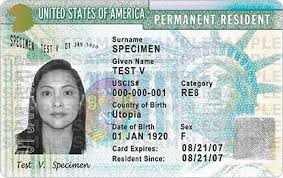Every year hundreds of thousands of foreigners become permanent residents of the United States. These permanent residents, or green card holders, often need to travel internationally soon after their arrival for various personal and business reasons.
Some may need to take care of their elderly parents; others may have to sell their assets from their home countries or wrap up their business affairs. These new residents often wonder what documents are required for their international travel and safe return to the United States.
Some may need to take care of their elderly parents; others may have to sell their assets from their home countries or wrap up their business affairs. These new residents often wonder what documents are required for their international travel and safe return to the United States.
Documents needed to travel outside the United States
Generally, legal residents need valid passports from their countries of citizenship to travel to other countries. For a passport to be valid, it must not be cancelled and be valid for at least six (6) months or longer. For those individuals who do not have valid passports (e.g., asylees or refugees), they should apply for refugee travel documents to travel to a foreign country. Further, the country that they are travelling to may also have other entry/exit requirements such as a visa to enter. One should consult with these countries' embassies or the U.S. State Department to find out about these requirements.
Documents needed to reenter the United States
For permanent residents (aka lawful permanent residents, legal residents), they need to present their valid, unexpired Permanent Resident Cards (or "green cards") to re-enter the United States after temporary travel abroad. Upon arrival at a port of entry, a U.S. Customs and Border Protection (CBP) Officer will examine returning residents' permanent resident cards and any other identity documents, such as a passports, foreign national I.D. cards or U.S. Driver’s Licenses, etc., and determine if they can re-enter the United States.
Would permanent residents lose their green card after international travel?
Normally, permanent residents are allowed to travel outside the United States for short periods of time. However, if a CBP officer determines that a permanent resident has no intent to live in the the United States permanently, then the person could be found to have abandoned his/her permanent resident status. A general rule is that if a resident has been absent from the United States for more than a year, the person is considered to have abandoned his or her green card. Absence of six months or longer creates a legal presumption of abandonment unless one can provide evidence to overcome this presumption. Sometimes short but frequent trips may also serve as evidence of a person's giving up of his or her permanent resident status. Ultimately, the DHS or the Immigration Court will look at factors such as family and community ties, employment history, income taxes, bank accounts, insurance documents, etc. to determine if abandonment has occurred.
Traveling aboard for one year or longer
Permanent residents who must be absent from the United States for longer than a year should first apply for a reentry permit on Form I-131. Generally speaking, securing a reentry permit before leaving the United States allows a permanent or conditional permanent resident to return to the U.S. after prolonged international travel. Obtaining a reentry permit does not guarantee one's entry into the United States if the person is found to be otherwise inadmissible. In the era of COVID-19, many legal residents are not able to return to the United States due to various travel restrictions. If you are not sure about your situation, it is important to first consult with an experienced immigration lawyer before making travel plans.

No comments:
Post a Comment